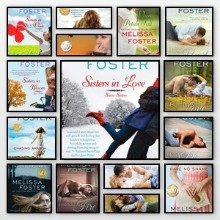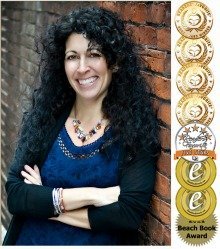RB: Tell me about your writing journey. How did you get started as an author, and what’s your history?
MF: I have an entrepreneurial spirit. I started an HR company at 20 years old and was earning six figures by the time I was 22. I also founded a nanny placement agency, and eventually took a Director of Human Resources and Administration position. My entire corporate career, although exciting, was a hold-over until I was able to dedicate my time to writing. In 1999 my husband and I changed our lives dramatically. I quit work to stay home with our kids and write, but with a gaggle of children running around, I found myself unable to concentrate (can you imagine?). Instead, I painted murals (kidsmuralsbymelissa.com) and donated several to a local hospital for children. I was biding my time. I’m not someone who can write in fits and spurts. I need hours to climb into my characters’ heads and find their voice. In September 2006, when our youngest son went to kindergarten, I found my keyboard, and I’ve never looked back.
RB: You’ve had a number of very successful novels. What do you think sets your work apart from others in your genre?
MF: Luck, mainly:-)
RB: Do you have a set schedule for writing? Or just fit it in whenever you can?
MF: I covet my writing time like it’s a newborn baby. This month I’m writing from 7:30am until about 2:00 pm. During the school year I write from 8:45am-2pm, and I don’t write during July or August. That’s my rejuvenation time with my family.
RB: Do you plot and outline your stories first? Or just fly by the seat of your pants?
MF: I am a proud pantzer. Every time I sit down to write a new book, I look at the blank page and think about outlining. After staring at it for about two hours, and the page remaining blank, I accept that I just can’t plot, and off I go.
RB: How many hours a day would you say you write? Do you have word goals?
MF: Right now I’m working on word goals rather than hours, and my goal is 5K words each day. But during the school year I work towards hours of writing rather than word count.
RB: Describe your process from start to finish. You get an idea. Now what?
MF: Okay, let’s see. I get an idea and look around for something to write it on–a napkin works great. Then I generally spend a few days sitting alone and pondering where the idea might go. Once I have the plot and characters floating around in my head, and I feel I’ve gotten to know them well enough, I sit down and write. I send my work to beta readers along the way–usually half way through and then again at the end, and through many revisions. After the first draft is complete, I do a complete read through (printed out) and make changes, then I send that revision to my editor. We generally go back and forth 2-3 times before it’s ready for my beta readers to give me an entire critique. After the critique and revisions, it goes back to the editor until we’re both satisfied. What happens next depends on how I will publish.
If I self publish, I then work with the cover artist, work on formatting, and put together a marketing plan. Right now, though, I’m working with my agent, and my manuscript is on submission to publishers. We’ll see where that goes…
RB: Rewrite and polish. How many drafts do you do, generally? Do you focus on different things on each draft?
MF: That process depends so much on what and how I had written the manuscript. I rewrote Chasing Amanda five times, and Megan’s Way was edited and polished probably 4 times. Come Back to Me was edited twice and polished, and then ready to go. I think we become stronger writers with each book. Traces of Kara, my newest manuscript was edited twice and then I made another pass at revisions for my agent.
RB: Editing. What’s your approach? How has it worked for you?
MF: I’m awful at editing my own work, so I don’t even try. I have a marvelous editor and I rely on her for developmental and structural advice. I use copy editors for grammar and punctuation. What works for me, is to let the experts do their thing. I write the story, they help me to refine it.
RB: Writer’s block. Ever get it, and if so, how do you move past it?
MF: You know, I used to think writer’s block was garbage. I had never experienced it until this year, and then, I believe the only reason I did experience it was that I was trying to write a book based on someone else’s expectations, and losing that creative control cost me, in many ways. I will never do that again. The way I moved past it was to push aside what was expected of me and write what I felt. It felt great! BAM! Writer’s block was gone.
RB: How about environment. When you write, do you listen to music? What’s your work area like? Can you describe it?
MF: I’m a music hound. I must have it on at all times. In fact, music plays 24/7 in my office and my kitchen. I gain inspiration from my environment. I cannot write without windows. I had my office cut in half (literally) and put windows on two sides and glass 9′ doors on the third–they look out into two window-lined rooms. My office is comfortable and creative–nothing matches, but everything feels right. It’s like walking into a very small Pier One Imports.
RB: Do you ever get the urge to go back after a book is released and rewrite parts of it? Or is it done once it’s done?
MF: I get the urge to rewrite, for quality of the writing, but I don’t think I’ll do it. I think both Megan’s Way and Chasing Amanda could be written more succinctly, but I’m done with them, and as writers, the more we write, the more we know. When I write the follow-up book to Megan’s Way, then the writing will be stronger. I am not embarrassed to have grown as a writer, and I want to be able to look back at those books and recognize how far I’ve come.
RB: Whose work would you say influences yours the most, and why?
MF: I hate this question. I learn from every writer that I read–whether it’s learning about what I want to mimic or something that I need to steer clear of, it’s all valuable.
RB: Why did you become a writer? What made you passionate to do so?
MF: This is funny, but true. In about 1991, I put my son down for a nap and had an overwhelming urge to write–out of the blue. I grabbed my IBM Thinkpad and a yellow legal pad, sat in a chair beside a window that overlooked a lake, and began writing. I craved the writing process from that moment on, but it took 15 years before my children were all in school and I could begin writing.
RB: Is there one quintessential Melissa Foster book that best defines your work? Which would you recommend a reader get if they could only get one of your books, and why?
MF: I can’t answer that, lol. The most well written is probably Come Back to Me, but the one that means the most to me is Megan’s Way. That book reveals a lot about the things I believe in.
RB: You work with a lot of indie authors with your World Literary Cafe. Tell us a little about that – how did it start, why did it start, and how has it changed? What is the ultimate animal going to look like, and what’s its goal?
MF: I love the WLC. When I started writing, I had very little help. I reached out to authors and was told they were too busy to provide guidance. Jodi Picoult was kind enough to answer my emails (thank you, Queen Jodi!), but as far as marketing and navigating the world of publishing, I was on my own. I decided right then and there, that I would never be too busy to help others learn the ropes, and that I would do whatever I could to help authors find everything they needed all in one place.
WLC began as a way to help authors learn to cross promote and market their books. It quickly took over my life, and the lives of the WLC volunteers, who are the most helpful and supportive group of women you could ever meet. I am in awe of their selflessness, their wit, and their energy. We have recently redefined where WLC is heading. We’re stepping out of running every promotion as a monthly stint, and driving the site to more of a community, where readers and authors have more interaction, bloggers and reviewers can connect and choose books based on availability, and education spans every aspect of self-publishing, from harnessing the power of social media to creating strong websites and platforms, and effective book marketing. Our educational arm, Fostering Success, has been established because I was doing a tremendous number of one-on-one seminars each week, and I still could not help as many authors as were coming to me. This venue will allow for hundreds of authors to take part in an economical and valuable fashion.
Where is WLC headed? An all encompassing community where authors will be given the opportunity to shine, learn to market their books, and connect with readers. Readers can look forward to literary events, giveaways, and personal connections with authors.
RB: If you had one minute to impart all the wisdom you’ve learned to date to other authors, what advice would you share with them?
MF: Eat a lot of chocolate and do what makes you happy. Write more, stalk your sales number less.
Award-winning, bestselling author Melissa Foster is a touchstone for the indie publishing community and a tireless advocate for women. She is the founder of the World Literary Café, Fostering Success, and The Women’s Nest. Melissa writes emotionally-driven contemporary fiction and suspense with passionate characters that remain with the reader long after they’ve read the last words. Melissa is a friend, mentor, brownie connoisseur, and book fiend.





 Melissa Foster is a New York Time and USA Today bestselling and award-winning author. She writes contemporary romance, new adult, contemporary women's fiction, suspense, and historical fiction with emotionally compelling characters that stay with you long after you turn the last page.
Melissa Foster is a New York Time and USA Today bestselling and award-winning author. She writes contemporary romance, new adult, contemporary women's fiction, suspense, and historical fiction with emotionally compelling characters that stay with you long after you turn the last page.